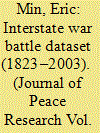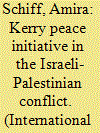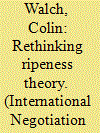|
|
|
Sort Order |
|
|
|
Items / Page
|
|
|
|
|
|
|
| Srl | Item |
| 1 |
ID:
190682


|
|
|
|
|
| Summary/Abstract |
This study investigates the peace process between the Turkish government and the PKK, invoking the mutually hurting stalemate (MHS) and mutually enticing opportunity (MEO) formulations of Ripeness Theory. It questions why the negotiations failed although Turkey’s conditions had become ripe for resolution. This research shows that even though the ripe moment occurred before the process steered the parties toward the negotiation table, their perspectives regarding the table ultimately changed due to both domestic and international developments. Hence, the MHS seized at the beginning of the process did not turn into the MEO that would lead to resolution.
|
|
|
|
|
|
|
|
|
|
|
|
|
|
|
|
| 2 |
ID:
178686


|
|
|
|
|
| Summary/Abstract |
Extant scholarship on interstate war and conflict resolution predominantly utilizes formal models, case studies, and statistical models with wars as the unit of analysis to assess the impact of battlefield activity on war duration and termination. As such, longstanding views of war have not been tested systematically using intraconflict measures, and deeper studies of war dynamics have also been hampered. I address these gaps by creating and introducing the Interstate War Battle (IWB) dataset, which captures the outcomes and dates of 1,708 battles across 97 interstate wars since 1823. This article describes the sources used to create these data, provides definitions, and presents descriptive statistics for the basic battle data and several daily-level measures constructed from them. I then use the data to test the implications of two major theoretical perspectives on conflict termination: the informational view, which emphasizes convergence in beliefs through battlefield activity; and Zartman’s ripeness theory, which highlights costly stalemates in fighting. I find suggestive evidence for informational views and little support for ripeness theory: new battlefield outcomes promote negotiated settlements, while battlefield stagnation undermines them. The IWB dataset has significant implications, highlights future research topics, and motivates a renewed research agenda on the empirical study of conflict.
|
|
|
|
|
|
|
|
|
|
|
|
|
|
|
|
| 3 |
ID:
158138


|
|
|
|
|
| Summary/Abstract |
This article examines the factors that contributed to the failure of the last major effort, which was carried out by US Secretary of State John Kerry, to facilitate a Final Status Agreement to resolve the Israeli-Palestinian conflict. The analysis is based on an understanding that every effort to resolve this intractable conflict, even if unsuccessful, is worthy of examination, which can yield interesting observations and insights that may inform future attempts to find a solution. As President Trump’s administration makes intensive efforts to broker an Israeli-Palestinian peace agreement, and the US Middle East negotiation delegation shuttles intensively between the parties and between major regional actors to explore the possibility of renewing official negotiations, this seems like an opportune time to review the major factors that affected the outcome of the previous peace talks.
|
|
|
|
|
|
|
|
|
|
|
|
|
|
|
|
| 4 |
ID:
143900


|
|
|
|
|
| Summary/Abstract |
How can ripeness theory be extended to explain when and why parties remain at the negotiating table until an agreement is reached? Existing ripeness theory is crucial in understanding when conflicting parties consider negotiation as preferable to continued fighting. However, factors which may explain why parties stay at the negotiation table after the start of the negotiation process – that is, how the ripe moment is sustained until an agreement has been reached – are not well elaborated. This study seeks to extend ripeness theory and argues that organizationally fragmented rebel groups are less flexible to make concessions and unlikely to stay at the negotiation table until an agreement is reached, especially when there is a lack of cohesion between the military and political branches. This argument is explored through a structured focused comparison of the peace negotiations in Colombia and in the Philippines with communist rebel groups.
|
|
|
|
|
|
|
|
|
|
|
|
|
|
|
|
| 5 |
ID:
184659


|
|
|
|
|
| Summary/Abstract |
This article discusses how the institutionalization of international mediation practices and its growing relevance since the end of the Cold War coincided with the formation of an epistemic community that shares common practices for a third party. This community focuses on core concepts that structure mediation practices such as efficiency, rationality, and the management of time and information. The article analyzes the consolidation of this community through the circulation of knowledge among scholars and practitioners. In particular, it highlights the place of the concept of ripeness, developed by Ira William Zartman, in stabilizing a division between a moment of conflict and a moment of nonconflict; and it discusses the place of the UN system in its dissemination among mediation practitioners. The article argues that the project-oriented understanding of mediation practices that arises from these shared conceptions contributes to an insulation of these practices from broader views of conflict within international politics.
|
|
|
|
|
|
|
|
|
|
|
|
|
|
|
|
|
|
|
|
|